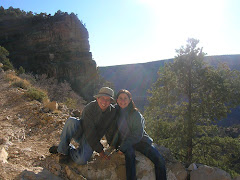An article about the President and the Pope from the Pew Forum (which reminds me, are there any, "The President and the Pope walk into a bar" jokes around?):
For Bush and Benedict, a personal and political bond
by Francis X. Rocca
Religion News Service
VATICAN CITY -- When President Bush pays a visit to Pope Benedict XVI at the Vatican next Friday (June 13), it will be his sixth meeting with a pope, and his third meeting with Benedict in just over a year.
Never in U.S. history has a president consulted so often with the leader of the Catholic Church. Carl Anderson, a former Reagan aide who now heads the Knights of Columbus, calls it "remarkable."
"Less than 50 years ago," he said, "it was a question as to whether a Catholic should even be able to run for president."
Bush has emphasized his admiration for the papacy, and in particular for Benedict, whom he has called a "very smart, loving man." When Benedict arrived in Washington in April, Bush personally met the pope on the tarmac, the only time that Bush has so honored any dignitary.
Less obvious is how the pope views the president. It is not only Benedict's relatively shy personality that prevents him from being so demonstrative, but the customary reserve that his office imposes on its occupants.
"These are the kinds of cards that popes don't show," said the Rev. Thomas J. Reese, a senior fellow at Georgetown University's Woodstock Theological Center, and author of "Inside the Vatican."
Yet according to informed observers, there is reason to believe that Benedict, despite some important policy differences with the president (most notably over Iraq), feels a genuine affinity with Bush as both a man and a leader.
For the pope, part of the attraction may lie in Bush's life story.
"I'd imagine that he has respect for the president as a man who turned his life around, had a conversion experience, stopped drinking and started living a religious life," said Reese.
Benedict, who has warned against the increasing secularization of Europe and praised the prominent role of religion in American public life, is likely to appreciate a head of state who is "not afraid to express his faith as a Christian," said the Rev. Joseph Fessio, a former student of the pope who now runs Ignatius Press, Benedict's principal English-language publisher.
In the president, the pope finds a key supporter of the Catholic church's positions on such controversial questions as abortion, stem-cell research and same-sex marriage. Bush's arguments have frequently echoed Benedict's appeals to "natural law" and even employ the terms of Catholic social doctrine (despite the fact that the president is a Methodist).
Nowhere has the congruence of their thinking been clearer than at April's welcoming ceremony at the White House, when Bush cited Benedict's denunciation of the "dictatorship of relativism," and the pope noted the importance of American religiosity as inspiration for abolitionism and the civil rights movement.
To which Bush replied, "Thank you, Your Holiness. Awesome speech."
"They could pretty much have given each other's speech," said William McGurn, Bush's former head speechwriter and a Catholic, who was present at the ceremony (but did not write the president's remarks).
Fessio agreed. "In terms of authentic, normative Catholic teaching, I don't see any area in which the pope and President Bush disagree," he said.
The most notable case of disharmony between the two leaders was over the 2003 invasion of Iraq, which then-Cardinal Joseph Ratzinger opposed at least as ardently as Pope John Paul II.
"But Iraq is not a matter of Catholic social teaching," Fessio said. "That was a prudential decision on whether or not the use of force was justified. The pope would be the first to tell you that good Catholics can disagree on that."
Likewise, Benedict's views on economics, taxation and government regulation (which are known to lie to the left of Bush's) are merely his personal opinions, not doctrine that he holds as binding on the faithful, Fessio said.
In any case, it would be uncharacteristically undiplomatic of any pope to let past differences get in the way of constructive collaboration with a world superpower.
"The Vatican knows how to agree and disagree with heads of state and work with them anyway," Reese said. "It's got a big agenda."
Among the agenda items likely to come up in next Friday's discussion, several observers agreed, is the ever worsening plight of Christians in the Middle East, especially Iraq.
"As horrified as the Vatican may have been that we went in there, my sense is that they don't want us to leave until we've fixed things," McGurn said. "My suspicion is that the Vatican fears that we're going to skedaddle and leave the population in the lurch."




